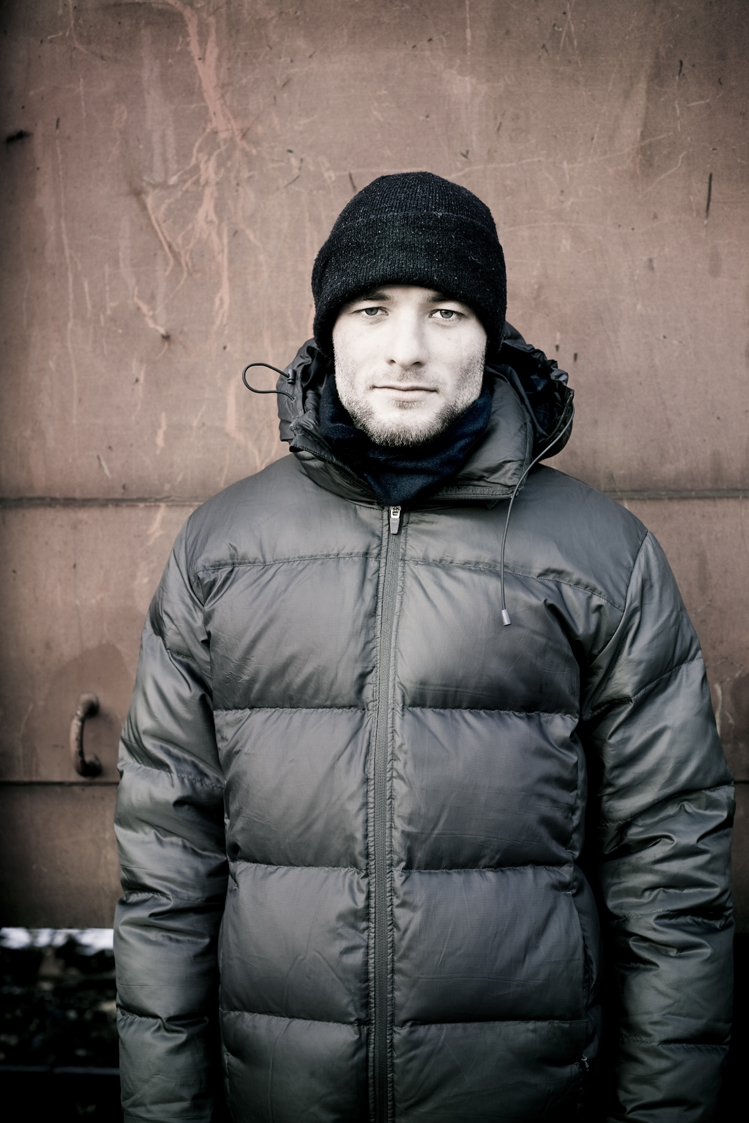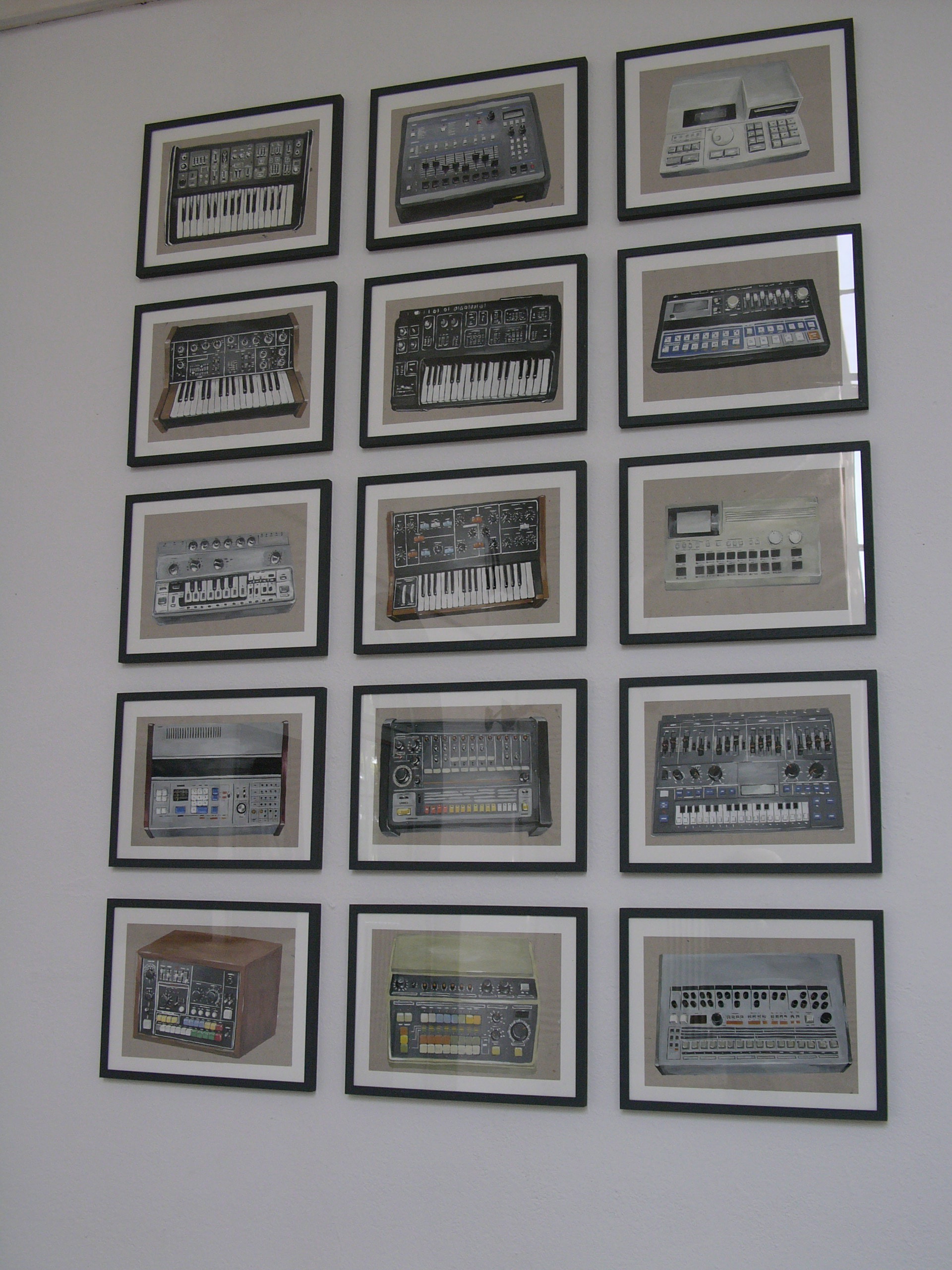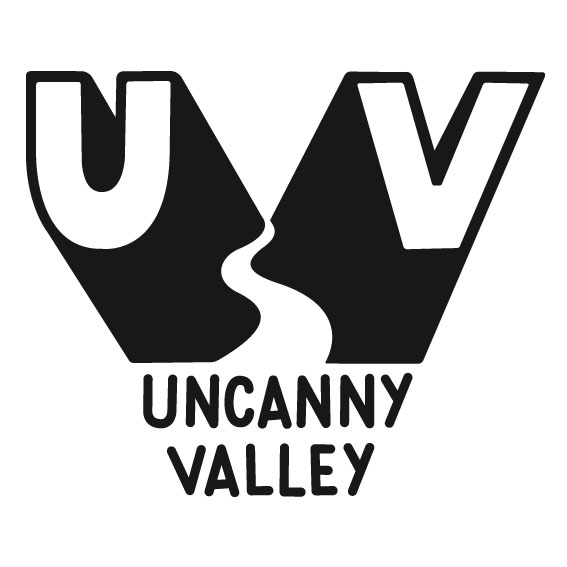kurz vorab: leider gab es im Zuge des Eventkalender-Updates ein paar Problemchen. Er ist jetzt zwar wieder online aber der Login für die Veranstalter ist leider noch offline. Wir arbeiten mit Hochdruck dran und geben euch Bescheid wenn wieder alles rund läuft. jetzt aber erstmal viel Spaß mit dem Interview…
Was haben Kannibalenfilme, Zahlentheorien und Vögel gemein? Sie alle schwirren Alexander Dorn alias Credit 00 durch den Kopf wenn er mit Händen an Drummachines und Synthesizern zu seinen erfrischend-altbackenen Ergebnissen kommt. Der Musiker aus den Künstler-Kollektiv Uncanny Valley sprach mit uns über falsche Vergangenheitsbewältigung, das allumfassende Genre Futureshock und brennende Plattenläden in Dresden. Als Gast in der Reihe ‘Echo Waves’ wird er uns am 19. Januar im Club Vanguarde mit seinen Platten davon zu überzeugen versuchen, dass House, Afro, Synthpop und Electro eigentlich eins sind. Und rennt damit mindestens bei den Gastgebern Jago, Friday Dunard und Redlock offene Türen ein.
Wie kann man sich einen Abend mit Credit 00 vorstellen?
Credit 00: Ich spiele die Musik, die mir am Herzen liegt und von der ich denke, dass die Leute sie auf jeden Fall hören sollten. Alt wie neu, genretechnisch schränke ich mich da nicht ein: House, Techno, Disco, Italo, Electro, Afro, Synthpop, New Beat… für mich ist das alles ein Ding. Ich würde das sogar alles Techno nennen oder Futureshock Music. Und natürlich nehmen alle einen Drink und wir haben uns alle lieb!
Wie weit geht deine Musikleidenschaft zurück, welche Artists haben dich geprägt?
Ich kann mich erinnern als ich meine Hörspielkassetten überspielt und die Depeche Mode-Tapes meiner Schwester geklaut hab, wann war das? So mit 10? Prägend war auf jeden Fall am Anfang Hip Hop – nicht nur musikalisch, sondern auch was das ganze Kulturding angeht mit Breakdance, Graffiti… Afrika Bambaataa hat ja auch alles zusammen gebracht: Punk, Techno, Funk, Soul…Und ich hatte das Glück, als junger Steppke einen guten Freund zu haben, der mir auch Jeff Mills vorgespielt hat, obwohl ich das damals noch gar nicht gerafft hab. Auf jeden Fall hab ich dadurch gecheckt, dass das alles verbunden ist, ein universelles Ganzes.
Was hat dich fürs Musik machen begeistert?
Ich hatte mal eine MC 303-Groovebox von einem Freund in die Hände bekommen, da sind alle Sounds drauf, die man von allen möglichen klassischen Dance-Platten kennt. Das hat mich begeistert: „Hey, da kann ich einen Beat machen, der klingt wie Planet Rock.“ Später haben dann viele meiner Freunde in Dresden Bedroom-Studios gehabt, die mich schon optisch immer super gereizt haben. Ein Mitbewohner, der schon ewig an Synths rumschraubt, hat mir dann gezeigt, welche Knöpfe ich drücken muss. So bin ich da immer mehr rein gerutscht und hab mehr Drummachines und Synths gekauft.
Dein Sound weist immer wieder auf die Vergangenheit, die Geschichte der elektronischen Tanzmusik hin. War früher alles besser?
Kann ich schwer sagen, da ich nicht dabei war. Ich kauf’ natürlich schon sehr viel alte Platten und irgendwie ist das auch komisch, ich denke manchmal: Vielleicht findet man die auch nur aus heutiger Sicht so super. Gutes Beispiel sind da immer Bands, die es heute noch gibt oder die Comebacks haben, die finden ja teilweise ihre alten Aufnahmen schlecht und kotzen immer ab, dass damals alle Synths dauernd out of tune liefen und dann nehmen sie ihr altes Zeug neu auf und das finde ich dann meistens absolut daneben. Da, finde ich, war die dreckige 80ies-Demo-Version um Welten besser, aber vielleicht habe ich diese Musiksache einfach auch nur falsch verstanden. Vielleicht war früher die Musik besser, ich mein, hör dir heute mal Kraftwerk an – ich liebe Kraftwerk, aber was der Hütter da heute mit den alten Tracks macht…Mit der ganzen Industrie-, MP3-, Majorlabel-Debatte fang ich jetzt nicht an, da ich da eh nicht durch sehe. Was gut ist heute, ist die Vernetzung untereinander – kleine Labels, die 100 Platten pressen, und du kannst das auf der anderen Seite der Welt im Netz hören und kaufen, das ist super. Blöd ist natürlich wenn der Plattenladen um die Ecke zu machen muss – wenn der aber offen bleibt ist heut alles gut und sogar besser!
Wie wichtig ist dir bei deinen Produktionen das Zeitgemäße, das Zeitlose – oder gar der vorsichtige Blick in die Zukunft?
Ich gehe ans Musik machen eigentlich total intuitiv ran und hab da auch keinen Anspruch, das Rad neu zu erfinden. Gleichzeitig möchte ich natürlich auch nicht den einmillionsten Blueprint 303-Acid-Track machen (nichts gegen Acid-Tracks!). Ich versuche, Sachen, die ich mag, die vielleicht auch althergebracht sind, zu verbinden und mache dann Drexciyan Happy House oder sowas. Man macht heutzutage auch zwangsläufig irgendwie neue Sachen, da einem eine Unmenge an Musik aus jeglichen Richtungen und Epochen als Inspiration zur Verfügung steht.
Du hast Kunst studiert. Inwiefern hat das mit der Musik, die du machst und auflegst, zu tun?
Ich verbinde die Sachen jetzt nicht direkt und mache Soundinstallationen oder sowas – zumindest noch nicht – aber natürlich beeinflusst das eine das andere und umgekehrt. Zum Beispiel hab ich mir, bevor ich überhaupt Synths hatte, welche gemalt, weil ich so auf die Dinger stand. Mich interessiert auch das ganze Post Punk/New Wave-Ding sehr, das ja speziell in der Düsseldorfer Kunstszene stark verankert ist. Das ist auch die einzige „Rechtfertigung“ für mein Musikmachen, da ich ja keinerlei musikalische Ausbildung habe, also sag ich einfach: Das ist Kunst. Ist ja auch so: Musik = Kunst = Musik.
Das Label Uncanny Valley (UV), auf dem du veröffentlichst, mischt seit 2,5 Jahren nicht nur Dresden, sondern die ganze europäische Clubszene mit seinen Releases auf. Was macht den Erfolg aus?
Ich war und bin auch sehr überrascht und natürlich froh über das super Feedback und große Interesse. Ich könnte jetzt aber nicht sagen, woran das genau liegt. Vielleicht weil Dresden seit langem oder noch nie so richtig beachtet wurde und jetzt alle die netten Waldmenschen aus dem östlichsten Osten irgendwie süß finden.
Was hat sich in Dresden mit dem Label verändert? Können sich andere Städte etwas
davon abschauen?
Durch UV haben sich auf jeden Fall viele Leute getroffen, die vorher kaum miteinander zu tun hatten oder noch nicht einmal voneinander wussten. Dadurch passiert natürlich viel Neues: Leute machen Tracks zusammen, schmeißen Partys oder machen Grafik oder Video für gemeinsame Projekte. Das ist natürlich super positiv, man bekommt eine Menge Input, was auch die eigenen Sachen vorantreibt.
Ob sich jetzt andere Städte davon ne Scheibe abschneiden können, weiß ich nicht. Aber der Zusammenhalt ist in Dresden schon sehr groß, liegt sicherlich auch an der Größe des Dorfes. Bestes Beispiel dafür war der Brand letztes Jahr im lokalen Plattenladen Fat Fenders, da standen dann eben am nächsten Tag fünfzig Leute davor, haben geholfen und der Laden war nach einer Woche wieder offen.
Was verbindest du mit Karlsruhe?
Als erstes fällt mir natürlich das ZKM ein, das habe ich mir auch angeschaut, als ich mal für einen Tag in Karlsruhe war. In Sachen Musik kenn ich den Scherbe, aber der wohnt jetzt in Dresden und macht Musik auf UV. Ansonsten… ihr habt super Wein, oder?
Drei aktuelle Lieblingsplatten?
Moon B – Untitled – Peoples Potential Unlimited
Delroy Edwards – Feelings – L.I.E.S.
O B Ignitt – Oh Jabba – FXHE Records
Danke für das Interview und viel Spaß am 19.01. in Karlsruhe!
Das Interview führte Friedemann Dupelius.
>> weitere Infos zum Termin!
englische Version
How can one imagine a night with Credit 00?
Credit 00: I play music close to my heart and music I think people definitely should hear. Old and new, I don’t limit myself in terms of genres: House, Techno, Italo, Electro, Afro, Synthpop, New Beat… for me that’s all one. Actually I would call all that Techno or Futureshock Music. And, of course, everyone is drinking and loving each other!
How far back goes your passion for music and which artists have inspired you?
I remember overdubbing my audio-drama cassettes and stealing my sisters Depeche Mode tapes, when was that? I was 10 maybe? Hip Hop was definitely very influential for me in the beginning – not only musically, but as a whole culture with breakdance, grafitti… Afrika Bambaataa brought all that together: Punk, Techno, Funk, Soul… And as young boy I was lucky enough to have a friend who showed me Jeff Mills, although I didn’t get it at all back then. But I realized that all this is connected, one universal thing.
What sparked your interest in producing?
At one point I got my hands on my friends MC 303-Groovebox which had all the sounds you know from all sorts of classic dance records. That excited me: ‘Hey, I can make a beat sounding just like Planet Rock’. Later a lot of my friends in Dresden had bedroom studios which always interested me, even visually. A room mate who already modyfied synths for years then tought me which buttons to push. That’s the way I got more and more involved and bought drummachines and synths.
Your sound always hints to the past, the history of electronic dance music. Were those the days?
I don’t know, I wasn’t there. Sure I buy a lot of old records and somehow that’s strange at times: maybe you only like them from todays perspective. A good example are the bands which are around for a long time or have a comeback. Some of them don’t like their old recordings und hate the fact that all the synths kept going out of tune, so they re-record their stuff, which I think goes completely wrong almost every time. That dirty 80tis demo-version was far better in my opininion but then again maybe I just misunderstand this music. Maybe the music was better back then, I mean, listen to Kraftwerk – i love Kraftwerk, but what Hütter is doing now with the old tracks… I’m not starting on the whole ‘industry-mp3-major-label’ debate, mainly because I don’t see through all that. What’s great nowadays is the networking – small labels pressing 100 copies and you can listen to it and buy it online sitting on the other side of the world. Sure, it sucks when the record shop around the corner has to close – but if the shop is able to remain open, everything is good and even better today!
In your production, how important is the contemporary, the timeless – and maybe a carefull glimpse into the future?
My appoach to music is very intuitive and I don’t claim to reinvent the wheel either. At the same time I don’t want to make the millionst blue print 303 acid track (nothing against acid tracks in general!) I try to combine the stuff I like which might be a bit oldfashioned and produce Drexciyan Happy House or something. And today you produce a new sound inevitably, because you’re inspired by the huge amount of music available to you spanning so many genres and times.
You studied art. How much does that influence your production or DJ-ing?
I haven’t connected the two realms and made a sound installation or whatever – yet – but an influence on one another is definitely there. For example, before I even owned one synth I already painted them because I liked them so much. Also I’m very interested in that whole Post Punk/New Wave thing which is prominently rooted in the Düsseldorfer art scene. That’s really the only ‘justification’ for my productions without having any musical education, I just say: that’s art. And it is: music = art = music.
The label Uncanny Valley (UV), on which you music is released, isn’t only stirring up the Dresden scene but also the european club scene. What’s the success about?
I was and am very suprised, too, and naturally very happy about the great feedback und huge interest. But I couldn’t really pinpoint the reason for that. Maybe because for a long time the people didn’t really care about Dresden but now somehow have started to find the nice eastern wood people cute.
What did change in Dresden with the label? Could other cities maybe take something from that?
Through UV a lot of people have met that didn’t know each other and hadn’t even heard from another before. As a result a lot of new things happen naturally: people producing tracks together, hosting parties or working together on graphic and video design for common projects. That’s super positive because you get a lot of input that really pushes your own stuff forward. If another city can learn something from that, I don’t know. But solidarity is huge in Dresden, surely because of the village’s size. A good exmaple for that is the fire last year at the record shop Fat Fenders. The next day fifty people stood outside the door and helped so the shop could re-open the week after.
What comes to mind when you think of Karlsruhe?
Naturally I think about the ZKM first, which I visited once I spent a day in Karlsruhe. In terms of music I know Scherbe but he lives in Dresden now and releases music on UV. What else… you have very good wine, don’t you?
Three current favorites?
Moon B – Untitled – Peoples Potential Unlimited
Delroy Edwards – Feelings – L.I.E.S.
O B Ignitt – Oh Jabba – FXHE Records
thank you for the interview!









1 comment